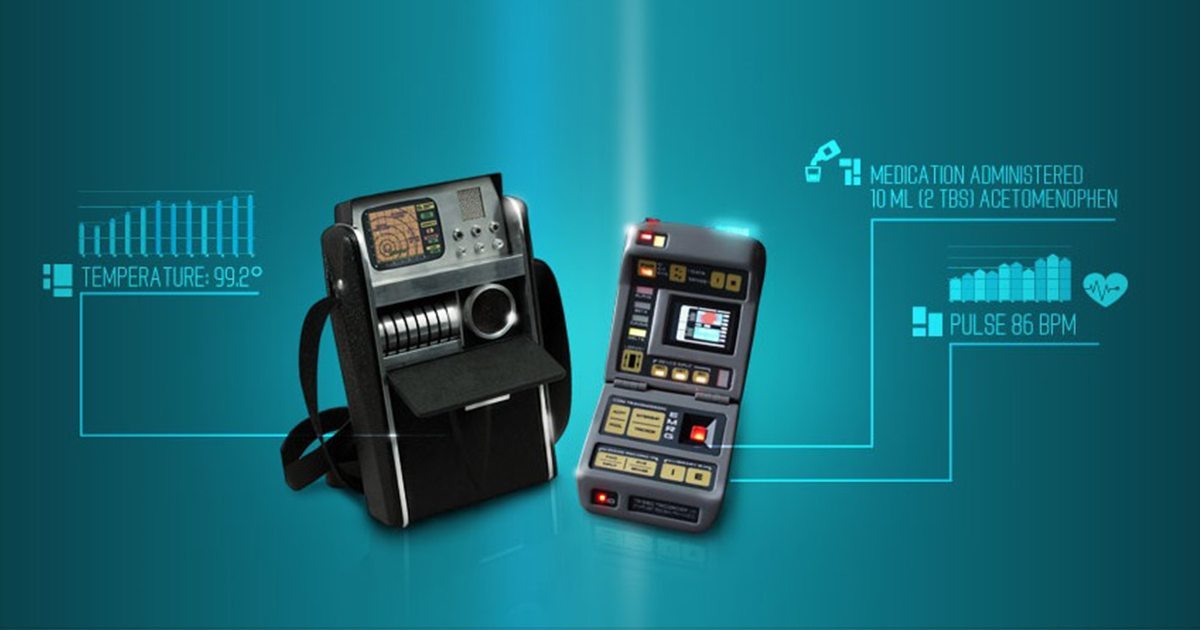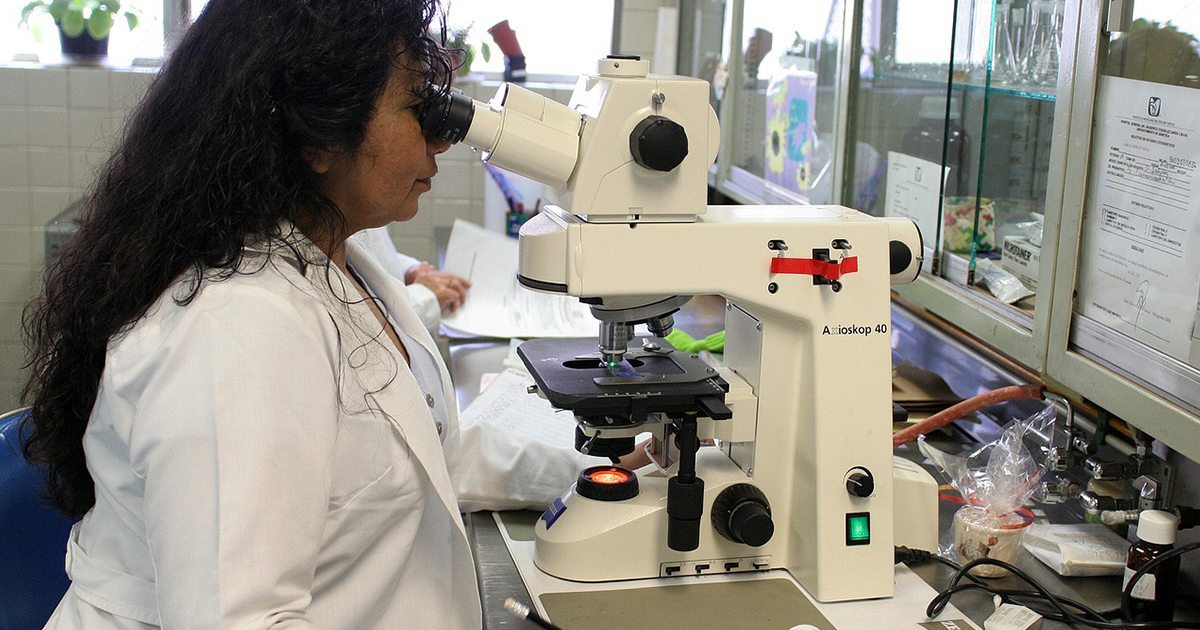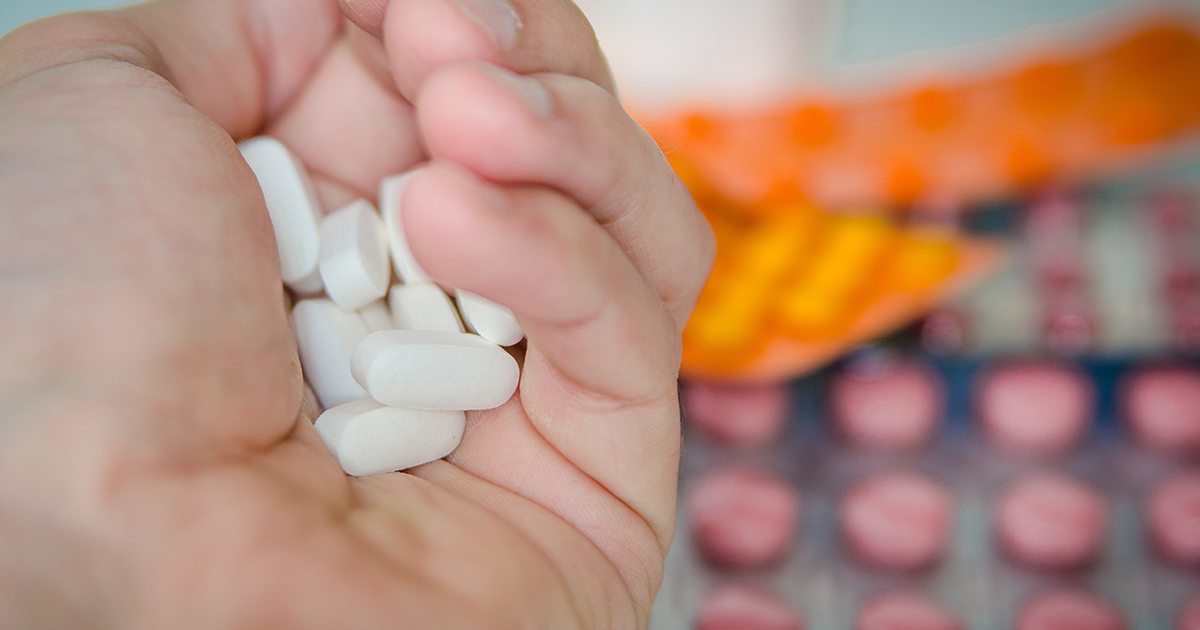Mesothelioma Help Cancer News

Contest Could Bring Handheld Medical Tool to Mesothelioma Patients
One of the props used by Dr. McCoy, of the iconic 1960s television series Star Trek, was the Tricorder. With a point, swipe, and beep, the doctor could examine and diagnose the USS Enterprise’s crew members. Now, thanks to a contest, this science fiction device may soon become a reality bringing “healthcare to the palm of your hand,” and helping mesothelioma patients avoid some of their countless medical appointments.
The Qualcomm Foundation, along with the world’s leading visionaries, hold a three-day summit each year to brainstorm ideas to help mitigate some of the challenges facing the world. The goal is to create an incentivized global competition that could lead to a solution to the problem. In 2012, the summit attendees focused on healthcare.
With all the technological advances, the team thought, it is inconceivable that an individual has to physically go to a healthcare facility, clinic, or doctor for a diagnosis of any condition. They felt this model of health care has led to bottlenecks to access of care, backlogs in laboratories, and a rise in healthcare costs. The visionaries agreed that a medical device, for consumers, could be designed to address this problem. The Qualcomm Tricorder XPRIZE competition, with a total prize package of $10 million, was conceived to spur the creation of Dr. McCoy’s Tricorder.
U.S. Team Takes Top Prize
On April 12, 2017, the U.S. team, Final Frontier Medical Devices, based in Pennsylvania, was announced the winner of the nearly five-year competition netting them $2.6 million to help bring the prototype to reality. Led by two brothers, Dr. Basil Harris, an emergency medicine physician, and George Harris, a network engineer, the team created DxtER.
The second place winner, Dynamical Biomarkers Group of Taiwan, received $1 million to help bring their device to fruition.
“It is very exciting that our vision of mobile, personalized patient-centric healthcare is getting closer to becoming a reality thanks to the great work of the Qualcomm Tricorder XPRIZE teams,” said Dr. Paul E. Jacobs, executive chairman of Qualcomm Incorporated, in an April 13 press release announcing the winner. “Creating technology breakthroughs in an industry as complex as healthcare is quite a milestone, and what these teams accomplished is a great stepping stone to making mobile healthcare a viable option across the world.”
The field began with 312 teams from 38 countries all working to create a Tricorder prototype. During the multi-year competition the field was narrowed to 29 teams from nine countries, and finally to two finalists from two countries. The two final teams, representing the U.S. and Taiwan, were chosen in December 2016.
Five-Pound Device Houses Complex Functionality
“Our device is smart and simple, giving people the help and answers they need when they need this input the most,” said Dr. Basil Harris, founder of Basil Leaf Technologies, in a press release announcing his team’s success.
The final product had to adhere to strict requirements such as allowing an individual to determine if and what care is required without leaving home; it should weigh no more than five pounds; it must collect, store, and share vital health data via the internet; and cause no harm to the consumer either by thermal or electrical energy, needles, lancets, or infections.
Expert Insight
Dr. Basil Harris
“There is nothing like it in existence, and we believe this technology will change the face of health care.”
In order to diagnose patient conditions, the device must be capable of collecting key health metrics like blood pressure, respiratory rates, and temperature over time and in various health states. The volume of data accumulated over time will allow the device to determine the consumers health conditions without expensive or invasive laboratory tests.
The winning prototype was to capture five real-time health vital signs, blood pressure, heart rate, oxygen saturation, respiratory rate, and temperature and identify 10 health conditions. The health conditions include: anemia, A-fib, COPD, diabetes, leukocytosis, pneumonia, otitis media, sleep apnea, urinary tract infection, and shingles. It must also be able to determine the absence of any condition allowing the patient to avoid unnecessary medications.
DxtER, the winning tool, is capable of diagnosing 34 health conditions.
Tricorder Benefits for Mesothelioma Patients
For mesothelioma patients and their caregivers, being able to determine, from the comfort of their home, what and if medical care is required, has significant benefits. Early detection of pneumonia, for example, can mean the difference between treatment at home and complications requiring hospitalization.
Mesothelioma, a rare cancer causally linked to asbestos exposure, is typically diagnosed in patients over the age of 65. At that age, many patients may have unrecognized medical problems that also need to be addressed. However, with the toll mesothelioma takes on a patient, symptoms that may mean a heart condition or diabetes often go ignored simply because of the burden of another round of doctors’ appointments and tests.
With the possibility of having their own diagnostic device at home that can collect their health data, assess the illness, and determine the appropriate course of action, whether that requires medical intervention or not, mesothelioma patients will feel more empowered, less stressed and may realize a better quality of life.
The device “gives users access to continuous, reliable health data – the information patients and providers need to more effectively manage chronic health conditions, such as diabetes and congestive heart failure,” according to Basil Leaf’s website.
With the advancements in mesothelioma care bringing the cancer closer to being a chronic disease, this device can allow patients to focus more on their lives and less on their illness.
The Qualcomm Foundation, and other strategic partners, are committed to seeing the Tricorder competition bring marketable products into the hands of consumers, and they have pledged millions of dollars in initiatives to support the teams.
To find out more about this exciting project visit the Qualcomm Tricorder XPRIZE website.
Photo Credit: Qualcomm Tricorder XPRIZE
Sources:
- Qualcomm Tricorder XPRIZE competition
http://tricorder.xprize.org/ - Basil Leaf’s website
http://www.basilleaftech.com/dxter/ - Basil Leaf Technologies
http://www.basilleaftech.com/blog-1/ - Dr. Paul E. Jacobs, executive chairman of Qualcomm Incorporated
http://tricorder.xprize.org/press-release/family-led-team-takes-top-prize-qualcomm-tricorder-xprize-competition

Recovery from Treatment Takes Times and Patience
When a person makes decisions regarding their health care it is usually after carefully weighing their options. They listen to the medical advice, conduct research, discuss it with their loved ones and listen to their inner voice. After making these decisions, it is difficult if the chosen path does not work out the way you had hoped or wanted.
This week, I met with a mesothelioma patient who was having a rough time. She is having a difficult recovery. After undergoing her chosen treatment, she has had multiple readmissions and visits to the clinic and emergency room. At the beginning of her journey, she was told the statistics regarding mesothelioma and interpreted it to mean with no treatment she would live just six months. However, by choosing some treatment, she was hoping to increase the chance at more quality time.
Her journey has not been easy. She is tired and wondering when she is going to feel better. As she continued she spoke about her thoughts in the beginning of not having treatment — she did entertain the option. She is well supported, but it seems no end to the fight of everyday life. She was not that symptomatic prior to treatment, occasionally she had some shortness of breath, but now she wonders aloud if doing nothing would have been the better choice.
Not many recoveries are without issues. Hopefully this patient is in the darkest part of her journey and soon the road will be more kind to her.
I think there are moments in all of our lives when we question our choices. Experience with mesothelioma patients has taught me that sometimes recovery takes more time, along with more sleep, getting outside and moving, and slowly patients find themselves starting to feel better.
When mesothelioma patients physically start feeling better, their outlook also starts improving. Every recovery is unique. People react differently to treatment and while some issues can be addressed and fixed, others simply take time. Give yourself time and look at each minor improvement as a victory.

Specialized Blood Vessels May Lead to Novel Mesothelioma Therapy
Last week, Mesothelioma Help reported that some, but not all, mesothelioma patients benefit from immunotherapy. Researchers found that cancer patients with a particular genetic mutation may not realize any benefits from immunotherapy treatments. Now, researchers report that by creating a combination treatment inhibiting the growth of new blood vessels while at the same time boosting the immune system, they can improve immunotherapy results.
According to researchers from VIB and KU Leuven, of Belgium, increased blood supply and decreased immune activity are critical components for cancer cells to multiply. Many researchers have focused on inhibiting that growth by focusing on one of those components. However, building on research that inhibiting blood vessel formation or using PD-L1 inhibitors for immunotherapy, when used individually, are only beneficial in a “minority of treated patients,” the research team, along with researchers from University of California and the Swiss Institute for Experimental Cancer Research, looked at combining the two therapies.
Using mouse models, when an anti-angiogenic therapy, designed to stop blood vessel formation, was combined with an immune boosting treatment the researchers were met with a “counterintuitive outcome.” The combination resulted in the formation of “specialized vessels that deliver cancer-fighting immune cells to the tumor,” helping to quash the cancer.
“It was interesting to observe that this combination of immune system-activating and anti-angiogenic antibodies causes a positive feedback loop,” said Prof. Dr. Gabriele Bergers, in an April 12 press release from VIB-KU Leuven. “The result is the growth of specific blood vessels that deliver cancer-fighting immune cells into the tumor.”
Mesothelioma is a signature cancer of asbestos, affecting the lining of the lungs or abdomen. The cancer is extremely aggressive, and the cancer cells continue to grow and multiply as additional blood vessels develop bringing more food and oxygen to them and the patient’s immune system is compromised.
Avastin, sometimes used in mesothelioma treatment, was the first U.S. Food and Drug Administration – approved biological therapy designed to inhibit blood vessel formation. In addition, the immunotherapy drug Keytruda, a PD-L1 inhibitor, has shown some success in enhancing the immune system to fight off cancer cells in mesothelioma patients.
Continued research in the combination of these two therapies could bring additional therapies to mesothelioma patients and other cancer patients fighting aggressive growth and limited treatments. Nearly 3,000 Americans are diagnosed with mesothelioma each year. There is no cure for the terminal cancer.
“Understanding the underlying mechanisms of the process will contribute to the overarching goal of developing new therapeutic approaches to boosting the immune system in tumors,” said Dr. Bergers.
See the April 12 issue of Science Translational Medicine for the full study.

Remembering Dad on His Birthday After Losing to Mesothelioma
I write this on what would have been my father’s 61st birthday. I write this with a broken heart and tear-stained cheeks. I write this as a daughter who lost her hero to the terrible clutches of mesothelioma.
Normally, Dad’s birthday would have been full of fun. Phone calls, visits, food, and a game with my great aunt (who spent her wedding anniversary waiting for him to be born) to see who would call to give their well wishes first! Now, in a stark, different reality, I find myself alone with my thoughts, imagining what today would have been like.
I imagine that today would have been spent with family as usual, but with the beautiful addition of his two-year-old granddaughter. The laughter that always accompanied time spent with my Dad would have been amplified with him enjoying her antics and singing our song, “You Are My Sunshine.”
Today should have been a day of celebrating Dad’s life with him present, not lovingly remembering him in the past. Thankfully, I have so many beautiful memories with him to always carry with me, but I will always mourn for those left unmade. Empty chairs, songs without a voice, and hearts broken, all because of mesothelioma.

Drug Effective in Fight Against MS May Prove Effective Against Mesothelioma
In the quest to find a more effective treatment for mesothelioma sufferers, researchers sometimes turn to medicines that are successful in treating other diseases. In February, MesotheliomaHelp reported on the use of a pinworm drug in the fight against cancer. Now, researchers report that a drug used to treat multiple sclerosis could be effective against mesothelioma.
Researchers from the University of Hawaii Cancer Center, joined by colleagues from University of Ferrara, Italy, and New York University Langone Medical Center, looked at the immunosuppressant drug fingolimod, or FTY720, approved for multiple sclerosis treatment, due to its anti-tumor activity reported in various cancers. The drug had not previously been considered for use in mesothelioma care.
Mesothelioma is a terminal cancer caused by the inhalation or ingestion of airborne asbestos fibers. The asbestos fibers lodge deep in the tissue surrounding the lungs, in the case of pleural mesothelioma, causing inflammation that festers for years. Chronic, persistent inflammation is known to lead to cancer, and according to a 2014 press release from UH, the inflammation “can cause mutations in cells even after 30-50 years of dormancy.”
The study, using mouse models to evaluate anti-tumor efficacy and toxicity profile of FTY720 in vivo, showed the drug could induce apoptosis (cell death) and reduce tumor growth in mesothelioma without causing toxicity.
“FTY720 is a potentially promising therapeutic agent for MM [malignant mesothelioma treatment],” concluded the researchers.
Research Costs Supported by State Grant
Mesothelioma research requires significant amounts of time and money, and without adequate funding projects may not be completed. The researchers noted that “the development of new therapeutic agents for rare cancers, such as MM [malignant mesothelioma], is hampered by the increasing costs of research and drug development from the laboratory to the patient’s bed.”
They added that using a drug repurposing approach, like this research aimed at using an MS drug to treat mesothelioma, “is a strategy that drastically reduces time and costs to bring a new drug to the market.”
The UH Cancer Center announced a $5 million grant from Hawaii’s governor to aid in the continued research to fight cancer in FY 2018 and 2019. The mesothelioma community is hopeful this money helps lead to a new, effective treatment for mesothelioma patients.
“As governor, I am committed to providing additional resources to combat cancer and engage in cancer research in Hawai’i,” Governor David Ige in the December 14 press release. “With our rapid advancements in technology and medical research, it’s time to find a cure once and for all.”
See the full study from UH researchers in the March 15 issue of the Journal of Translational Medicine.
https://www.ncbi.nlm.nih.gov/pmc/articles/PMC5353897/
Sources
- UH Cancer Center
http://www.uhcancercenter.org/about-us/news-room/news-releases/465 - 2014 press release from UH
http://www.uhcancercenter.org/component/content/article/18-news-releases/344-cancer-from-asbestos-caused-by-more-than-one-cell-mutation
Free Mesothelioma Patient & Treatment Guide
We’d like to offer you our in-depth guide, “A Patient’s Guide to Mesothelioma,” absolutely free of charge.
It contains a wealth of information and resources to help you better understand the condition, choose (and afford) appropriate treatment, and exercise your legal right to compensation.
Download Now